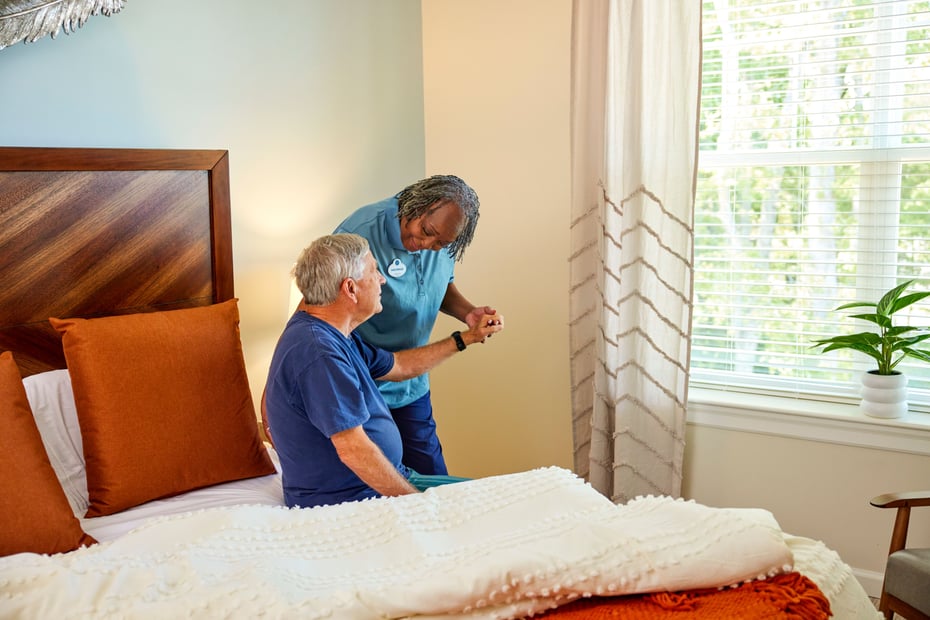
Seniors living with Alzheimer's disease or another form of dementia are at higher risk of accidents and wandering, which can cause both you and your loved one to worry about the "what ifs" when they live alone at home. Have peace of mind with a Naples, FL memory care community that prioritizes the safety and well-being of your loved one.However, not all communities are created equal. Discover essential safety features that a memory care community should have to ensure your parent or relative is in good hands.
Why Dementia Increases Security Risks
According to a study from Drexel University, older adults with dementia have twice the risk of falling and three times the risk of obtaining severe fall-related injuries, like a fracture, compared to those without dementia.
In addition to injury risks, seniors living with Alzheimer's disease and other forms of dementia can encounter other dangerous situations like getting lost or fender benders. Let's take a look at why safety measures in a memory care community are crucial.
- Cognitive decline and memory loss can lead to forgetfulness, which increases the chance of accidents and falls.
- Impaired judgment and decision-making abilities can result in poor choices or risky behaviors.
- Physical limitations and reduced motor skills can make accidents or injuries more prevalent.
- Confusion and disorientation can cause individuals to wander off, get lost, or be in unfamiliar or dangerous situations.
Memory care communities provide a safe, comfortable environment for seniors living with dementia, but they all don't have the same security measures. Discover essential safety features to keep your loved one out of harm's way.
Safety Features to Look for in a Memory Care Community
As you research and tour memory care communities, safety should be a top priority. Protect your loved one from dangerous situations by looking for a Naples, FL memory care community that has the following safety features:
Senior-Friendly Design
Consider whether the community is designed in a way that promotes comfort and calmness. From spacious apartments and cheery community spaces to wide pathways for wheelchairs and temperature control, the community should feel inviting.
Another design consideration is color. For example, colored dishware and toilet seats are easier to see; white can confuse residents whose depth perception is off.
Secure Entrances and Exits
The community should have secure entrances and exits to ensure resident safety. This can include features such as key card access, keypads, or staff monitoring to prevent residents from wandering off.
Wander Guard Systems
Wander guard systems are lightweight wearable devices or sensors that alert staff when a resident moves beyond a designated area. Not only does this keep residents safe, but it also allows them to maintain as much independence and freedom as possible.
Emergency Call Systems
You never know when an accident will happen, which is why every memory care community should have an emergency call system. Pull cords or wearable devices are popular types of emergency call systems that allow residents to easily call for assistance if needed.
Adequate Lighting
Lighting is crucial for residents with visual impairments or cognitive decline. Well-lit common areas, hallways, and outdoor spaces reduce the risk of falls and improve overall visibility. Motion-detection lights are also helpful for guiding residents to the bathroom at night.
Handrails and Grab Bars
Having handrails and grab bars throughout the memory care community can greatly enhance resident safety. They provide support and stability in bathrooms, hallways, and other areas, reducing the risk of falls and injuries.
Safe Medication Management
Memory care communities should have robust medication management systems in place to ensure residents receive the correct medications at the right times. A safe medication management program typically includes medication reminders, assistance with administration, and regular monitoring to prevent medication errors or missed doses.
Staff Training and Support
A secure memory care community isn't possible without well-trained staff members. The staff should receive ongoing training in memory care, communication techniques, and emergency response, ensuring they're equipped to handle any situation and provide residents with a safe and supportive environment.
Wellness Monitoring
Safety is more than physical security. Seniors living with dementia can experience a range of emotions like isolation, loneliness, and depression. That's why it's crucial that staff also keep an eye on the mental health of all residents, encouraging them to engage and socialize.
Find a Safe Community That Feels Like Home
You want to keep your loved one safe, but when they live alone at home, it's only a matter of time before they get hurt. Instead of worrying about when they'll have an accident or get lost, consider memory care communities in Naples, FL.
Look for robust safety measures like emergency call systems, safe medication management, senior-friendly design, and trained staff. With the community, you and your loved one will be able to focus on what matters most — their health and happiness.
Get our free Memory Care Checklist to make your search easier and find a community that prioritizes your loved one's total well-being.
